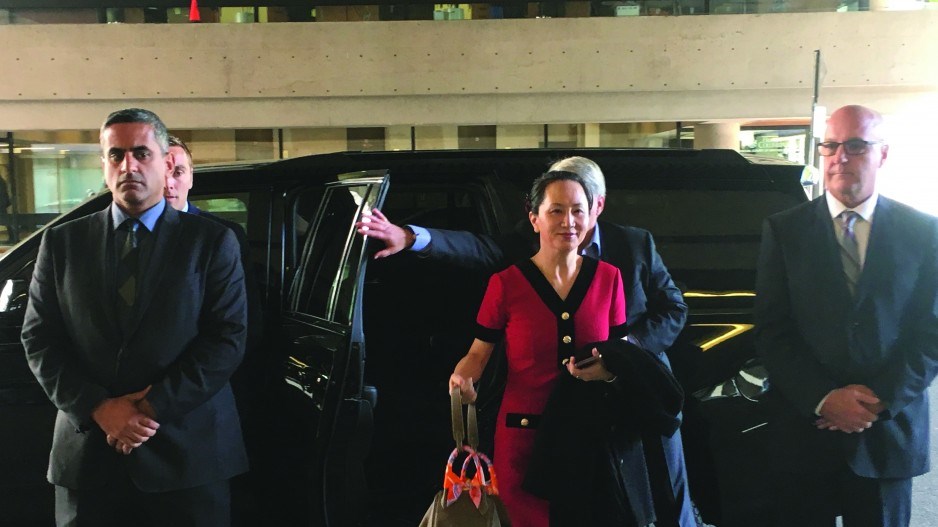Huawei Technologies CFO Meng Wanzhou began the final stretch of her extradition hearings – one of the highest profile legal cases in Canadian history – starting today at a Vancouver court.
The Chinese tech executive has entered the judicial phase of her extradition process today in front of BC Supreme Court associate Chief Justice Heather Holmes, as her defence and Crown counsel representing the United States make their final cases for Meng’s fate.
Defence lawyer Mona Duckett opened proceedings by finalizing her arguments of U.S. authorities' "third branch" of abuse of extradition processes for improper purpose (securing Meng under U.S. custody for alleged geopolitical reasons), accusing the U.S. Department of Justice of intentionally misleading Canada in presenting Meng's alleged crimes.
Duckett, who said the U.S. was “reduced to tricking the [Canadian] court to make their case seem stronger” since the Record of the Case (ROC) presented by American officials intentionally left out details that would prove Meng's innocence.
The misrepresentations in the ROC, Duckett said, betrays the original intent of an extradition treaty agreement between Ottawa and Washington.
"Partnership requires trust," Duckett said. "That trust, we expect, will be informed by the good faith of our partners... Obscuring context law and hiding facts by inaccurately summarizing documents to support a false narrative... is the antithesis of good faith."
Meng is facing fraud and money laundering charges in the United States stemming from a 2013 meeting with HSBC where the Huawei executive allegedly misrepresented the company’s relation to Skycom – essentially a subsidiary of Huawei’s – while the latter conducted business in Iran.
Authorities say the move – which led to the bank continuing its banking relationship with Huawei – exposed HSBC to risk of violating US sanctions against Iran at the time, and the funds from Skycom/Huawei then moved from Iran through the U.S. financial systems.
Meng has contended HSBC knew exactly what Skycom’s relationship to Huawei is, as Duckett reiterated this morning that an HSBC senior director was present at the 2013 presentation - which negates U.S. arguments that HSBC senior officials did not understand Huawei's relationship to Skycom as presented by Meng.
In the afternoon portion of the hearings, Meng defence laywer Frank Addario continued efforts to poke holes in the ROC, noting that U.S. authorities appeared to be moving the goalposts after Meng noted that an HSBC senior director was present at the 2013 presentation - as a supplemental version of the ROC changed that accusation to one where "no member of HSBC's risk management committee" knew of Skycom's relationship with Huawei.
Addario noted that these misrepresentations in the ROC does not fairly describe how HSBC is exposed to the risk of loss due to Meng's actions - a key element in determining whether Meng's actions constitute fraud.
"Key misrepresentations led to that false narrative," Addario said. "... How does a bank get fooled by a single PowerPoint [presentation]? How does that happen?"
The defence also argued that the U.S. had no jurisdiction over events that almost happened completely outside of American territory, and that officials misrepresented the facts of the case to Canadian authorities to secure Meng’s arrest in Vancouver in 2018.
The Meng case has not only been widely seen as a turning point in Canada-China relations but also one of the most salient examples of growing geopolitical tension between Washington and Beijing – with Ottawa in many observers' view caught in the middle.
The case is being intensely followed globally; during this morning's resumption of hearings, both the courtroom itself and a designated overflow room aimed to accommodate all public members wishing to observe the process were filled to capacity – with Holmes asking the courthouse to make provisions to add an additional courtroom to accommodate crowds who could not make it into the original courtroom/overflow space.
For the extradition case itself, Meng faces an uphill battle. The vast majority of extradition cases end in extradition, but Meng has argued that her case has been extraordinary in the U.S. and Canadian authorities’ reach to find jurisdiction over Meng’s conduct – as well as misrepresenting Meng’s actions to court in a bid to secure extradition.
The Crown has responded in many instances that Meng's arguments are for a legal trial in the United States – not an extradition hearing – to decide their merits. It is on such grounds that a number of Meng's bids to introduce new evidence to the case have been rejected by Holmes so far.
This portion of the hearings is slated to last three weeks.




